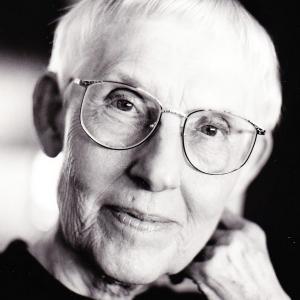Charlotte Joko Beck was born on this day, March 27th, in New Jersey, in 1917.
Sadly, I can say little more about her early life. She attended Oberlin Conservatory of Music, and spent some years as a pianist and piano teacher. She married. They had four children. After separating from her husband Charlotte worked at various things, including as a teacher, a secretary, and an administrative assistant at a university.
She became an early student of the Japanese Soto Zen missionary Hakuyu Taizan Maezumi, also studying with the Sanbo Zen teacher Hakuun Yasutani & the Rinzai Roshi Soen Nakagawa.
I wrote about her in my history of Zen in North America, Zen Master Who? A Guide to the People and Stories of Zen. What follows is largely adapted from that article.
In 1965, when she was in her forties, Charlotte Beck attended a lecture at the First Unitarian Church of San Diego. The speaker was the Japanese master Taizan Maezumi. She was struck by the quality of his presentation and quickly became a formal student. She attended numerous intensive meditation retreats as well as developing a solid regular practice. She also sat many retreats led by visiting teachers including as I mentioned above, Yasutani and Soen Nakagawa roshis.
She passed the Mu koan with master Soen. And then proceeded through the formal Harada-Yasutani curriculum. I am unclear as to when precisely she ordained but she received dharma transmission, acknowledgement of her own mastery of the Zen way by Maezumi Roshi in 1978. She was his third dharma successor.
Following revelations of sexual encounters with several students and other problems, in 1983 she broke with her teacher. Joko then founded the Ordinary Mind centered at the San Diego Zen Center, which she led.
Ordinary Mind was among the first Zen communities to consciously engage the emotional life and the shadows of the human mind as the stuff of Zen practice. She ceased using titles and stopped wearing her priest’s robes. Liturgical forms in those centers affiliated with her became increasingly minimal.
Her teaching style was particularly interesting. She played down kensho, calling those experiences, large or small, “small intimations.” And of Dharma transmission itself she called it “no big deal.”
Her heirs are among the most interesting and in some cases among the most important of our contemporary Zen teachers. Among these heirs Dr Barry Magid noted, “To me Joko always stressed experiencing the absolute in the midst of the everyday. (S)taying with anger or anxiety wasn’t so much a technique for dealing with emotion as a way of seeing emotion itself, resistance itself, as IT. Not as obstacles on the path to be worked through and removed, but the path itself.”
There were some controversies toward the end of her life. She repudiated several of her principal successors. What this means is hard to assess. In fact they would be acknowledged by her other heirs as well as by a senior teacher within the White Plum.
But to my mind even this complication spoke to her simple humanity, for good and ill. As it should be…
She died on June 15th, 2011. She was 94.
Many bows for one of our singular Zen founders…













